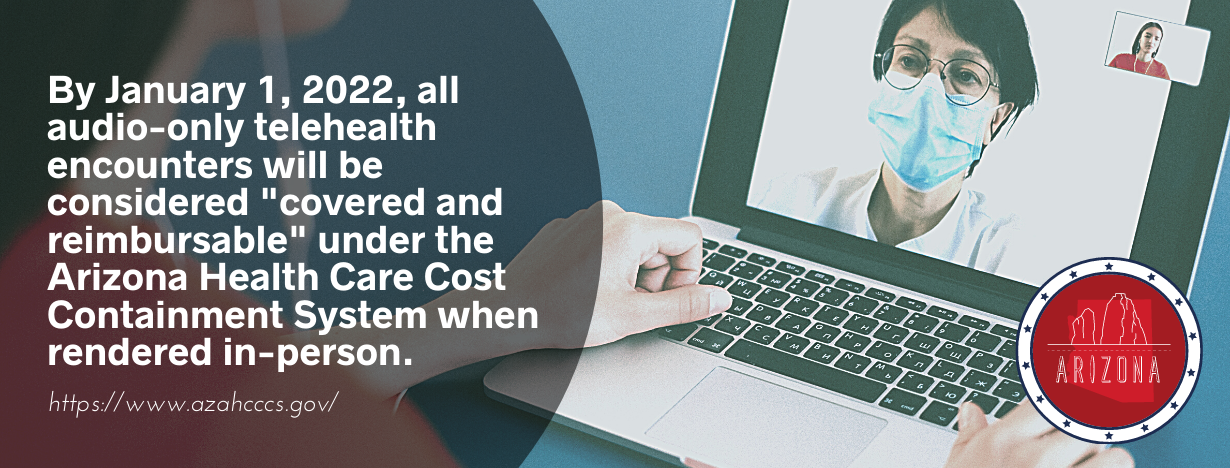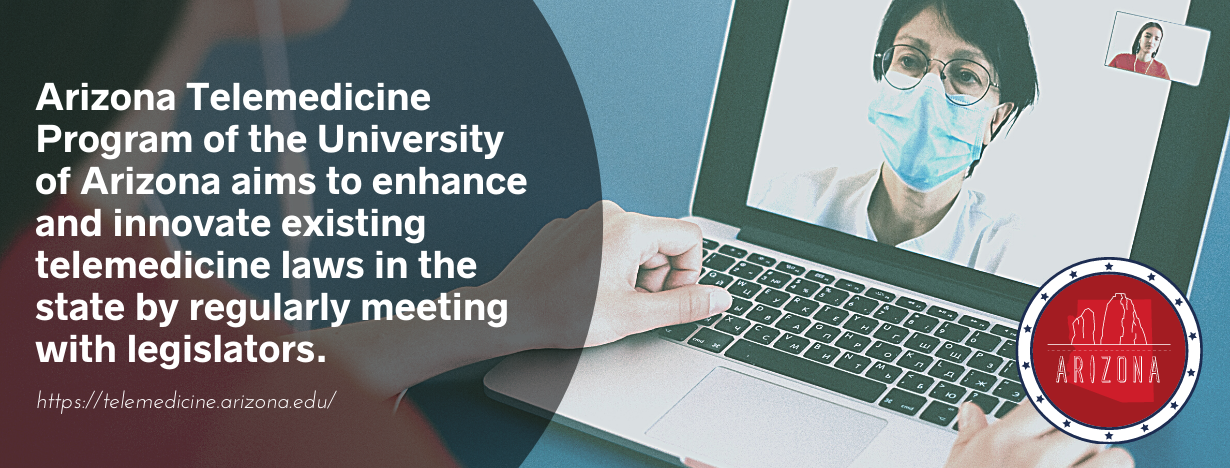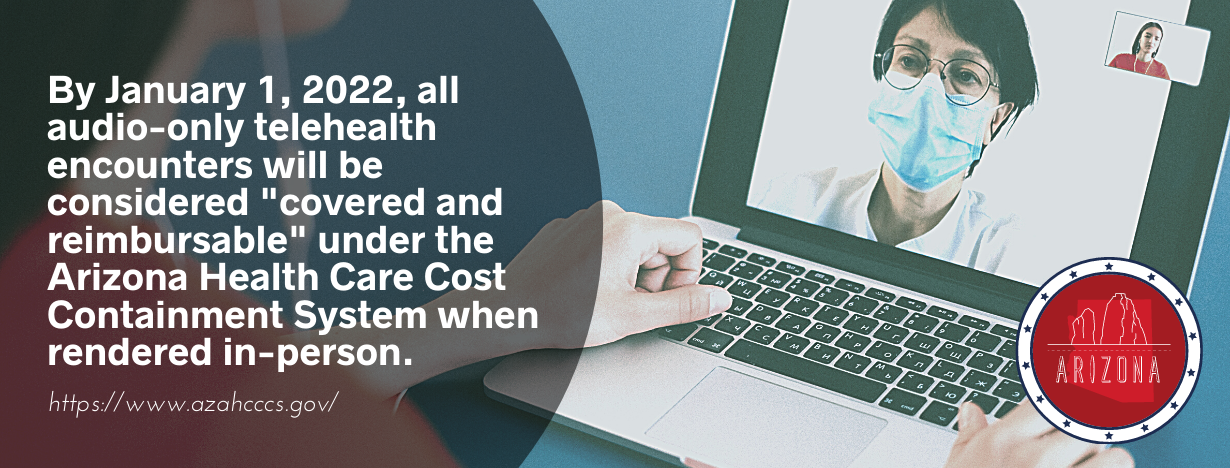Telehealth, as the broader concept of online medical services, is defined in the state of Arizona as the use of interactive technologies. It involves audio, video, and other electronic media or the use of asynchronous technologies for store-and-forward and remote patient monitoring modalities for assessment, consultation, diagnosis, transfer of medical data, treatment, and other healthcare services.
On the other hand, telemedicine is limited to synchronous, real-time, and interactive rendering of healthcare services for the specific purpose of consultation, diagnosis, and treatment. Under this modality, the patient must be present during the encounter.

Audio-only telephone encounters or telephonic services may also be utilized if an existing relationship exists between the patient and the provider. The telemedicine healthcare provider must also determine that the patient is not available for video conferences because of limitations on their functional status and available technology. It must be the patient who initiates this type of encounter or must have given prior authorization for the same.
By January 1, 2022, all audio-only telehealth encounters will be considered “covered and reimbursable” under the Arizona Health Care Cost Containment System when rendered in-person. The Telehealth Advisory Committee determines that the services can be appropriately delivered through this modality. For a claim for audio-only services to be approved, the telehealth provider must also make their services available via interactive audio, video, and other electronic means.
However, the state law explicitly excludes interactions through instant messages or voice mails and transmissions through fax machines or e-mails from the definition of telehealth and telemedicine.
Medical professional regulatory boards and similar agencies are mandated to submit a report on the number of out-of-state healthcare providers who have applied for registration and those whose application has been approved. They render services to patients located within Arizona state boundaries as provided for in House Bill 2454. This rule is to be followed beginning on October 1, 2021, and every month thereafter.
Health Care Service Organizations (HCSO) can, at their discretion, render healthcare services through telehealth and telemedicine means, telephone, and e-mail.
- Unmatched Feature of Telemedicine in Arizona
- Arizona State Telemedicine Laws and Policies
- Standard of Care
- Informed Consent
- Confidentiality
- E-prescription
- Telepsychology
- Teledentistry
- State Reimbursement Policy
- Remote Patient Monitoring
- Who gets these reimbursements?
- Public Health Emergency (PHE)
- 10 Top-rated Online Doctors and Telemedicine Providers in Arizona
- Telemedicine Resources in Arizona
Unmatched Feature of Telemedicine in Arizona
The state of Arizona has established a Telehealth Advisory Committee that is responsible for formulating guidelines on the best practices for this platform.
They likewise must give recommendations and updates about healthcare services that can be appropriately delivered through telemedicine, especially through audio-only modality.
The Committee’s establishment shows the state’s dedication to enhancing and encouraging telehealth and telemedicine practice within its boundaries.
Arizona State Telemedicine Laws and Policies
Who can practice telemedicine in Arizona?
Any health professional who is licensed in the state of Arizona has the liberty to expand their practice into telehealth and telemedicine as long as their scope of practice allows it and they comply with federal and state laws.
Out-of-State Providers
Healthcare practitioners who are not licensed under the Arizona Medical Board or other Arizona state licensing agencies must comply with all of the following requirements to be allowed to render telehealth services to persons situated in Arizona:
- Holder of a current, valid, and unrestricted license to practice medicine in another U.S. state;
- Have not been subjected to any restriction or disciplinary action under any jurisdiction;
- Registered with Arizona’s appropriate state regulatory board and have paid the corresponding fee;
- Practice by state laws and regulations on the scope of practice, the standard of care, best practice, telehealth requirements, prescribing, dispensing, and administering of drugs and devices;
- Maintain professional liability insurance for telehealth services rendered in the state of Arizona;
- Give consent that they can be subjected to disciplinary action or legal proceeding in this jurisdiction on all matters related to their medical practice in this state;
- If the practitioner intends to prescribe controlled substances, they must register with the state’s controlled substances prescription monitoring program;
- Submit an annual report indicating the number of individuals the provider has served in the state and the type of encounters;
Registered out-of-state providers under this program are not allowed to render in-person healthcare services in Arizona and are also not permitted to put up an office or clinic in the state. The only circumstance that a clinic may be established in the state is when they are part of a multistate provider group with an Arizona-licensed partner.
The following are circumstances when an out-of-state provider may render telehealthcare services in the state even without an Arizona-issued license:
- Emergency medication condition
- Aftercare for a patient who has undergone a medical procedure conducted by the out-of-state provider in another state
- When the patient who is located in Arizona is a resident of another state where the out-of-state provider is licensed and serves as the patient’s primary care provider or behavioral health provider
- When being consulted by an Arizona-licensed provider regarding the latter’s patient, as long as the consultations are infrequent or on a single occasion, only
- When the number of telehealth encounters rendered by the provider is less than ten annually
The venue for disciplinary actions and other cases that will be filed against the erring out-of-state telehealth provider is the patient’s residence.
Interstate Medical Licensure Compact
The state of Arizona was a member state of the Interstate Medical Licensure Compact (IMLC), serving as a State of Principal License (SPL) that has been actively processing applications of interested healthcare practitioners and issuing licenses.
However, Arizona asked to withdraw from the Compact and has already conditionally repealed House Bill 2502, which became effective in 2016. The probable reason behind the withdrawal is the state’s implementation of its own licensing and registration guidelines for out-of-state providers, having made permanent the issuances it made at the start of the current Covid-19 public health emergency.
Nurse Licensure Compact
Arizona is already considered an NLC state under the Compact by the enactment of its legislation. Through the Compact, registered nurses, licensed practical nurses, and vocational nurses in the state of Arizona can now extend their practice in other member states by the simple mutual recognition of their licenses. The practice, of course, is still regulated by each party state, and practitioners are subject to their jurisdiction and regulations.
Advanced practice nurses (APNs) are still not included in the application of the Nurse Licensure Compact despite the approval of the adoption of model language for this group of nurses.
All applications are coursed through the state’s board of nursing and not with the Compact itself. Qualified Arizonian RNs, LPNs, and V.N.s who wish to practice in other member states can submit their application before the Arizona State Board of Nursing. Compliance with continuing education hours requirement and criminal background and disciplinary action check is part of the application process.
Physical Therapy Compact
The Physical Therapy Compact or P.T. Compact serves as a channel for physical therapists and physical therapist assistants to render their professional services to other member states without going through the regular licensing process. The governing Commission comprises member states, delegates, and American Physical Therapy Association (APTA) and Federation of State Boards of Physical Therapy (FSBPT) representatives.
Interested eligible healthcare professionals may purchase a Compact Privilege to practice in another member state or multiple states. The online system developed by the P.T. Compact has simplified the whole process of availing of the privilege and its renewal. Patients can also verify their physical therapist or P.T. assistant’s status on the system through the public verification option by entering the name of the practitioner and the state they want to check.
The state of Arizona has been actively issuing and accepting Compact Privileges since 2016 under House Bill 2504, which confirmed the state’s membership in the P.T. Compact.
Psychology Interjurisdictional Compact
To aid in making mental healthcare more accessible, Arizona has sealed its membership with the Psychology Interjurisdictional Compact or PSYPACT last May 17, 2016, through the enactment of House Bill 2503.
Through this membership, psychologists who are holders of an Arizona license to practice may practice temporary in-person psychology and telepsychology in other member states and vice versa. It must be noted that this Compact is exclusive for psychologists only and is not open for other mental health professionals such as counselors or marriage and family therapists.
For telepsychology, psychologists from member states must be located in their Home State when rendering mental health services to residents of other member states.
It is the PSYPACT Commission itself that grants the Authority to Practice Interjurisdictional Telepsychology (APIT) or the Temporary Authorizations to Practice (TAP), but an additional requirement must be obtained from the Association of State and Provincial Psychology Boards (ASPPB). An E. Passport Certificate is needed for telepsychology, while an Interjurisdictional Practice Certificate (IPC) is a must for temporary in-person practice.
Standard of Care
Before rendering any healthcare services through telehealth and telemedicine modalities, an online provider must exert diligent effort to determine that:
- Telehealth or telemedicine is appropriate for the subject medical case based on the provider’s clinical judgment and the patient’s circumstances, such as their age, medical history, symptoms, diagnosis, location, and access to needed technology
- The communication medium to be utilized is the most effective in assessing, diagnosing, and treating the patient while factoring in the latter’s accessibility and ability to use the said medium
All telemedicine healthcare practitioners are subject to the rules, guidelines, and ethical standards set forth by the legislative, licensing boards, telehealth advisory committee, and national medical associations that apply to their respective practice.

Informed Consent
The informed consent required by state law may be obtained in verbal or written form. It will be given by the patient or by anyone who makes medical decisions for them if the patient is not capable.
All telehealth laws related to a patient’s informed consent will be strictly observed. The following are instances when informed consent is not needed before a doctor can render healthcare services via telehealth or telemedicine modalities:
- Emergencies wherein both the patient or their healthcare decision-maker are not capable of giving such informed consent
- When the patient is not physically present during the telehealth encounter
- When the interaction is meant to transmit diagnostic images or report diagnostic test results to or by the healthcare provider
The presence of informed consent, especially those obtained verbally, must be properly documented and indicated in the patient’s medical record.
Confidentiality
The Health Insurance Portability and Accountability Act (HIPAA), a federal law providing the standard to be observed when handling sensitive patient health information, is upheld by the local government.
All patients receiving any healthcare services from an online provider through telehealth means are entitled to the same level of confidentiality protection patients availing of in-person services are likewise entitled to.
Even for educational or research purposes, sharing of any patient information that gives out or establishes the identity of a specific individual is prohibited unless the patient gives his express consent to the same or unless authorized by applicable laws.
E-prescription
Before a healthcare provider may prescribe medications or prescription-only devices, an established doctor-patient relationship must exist, or a physical or mental health examination must have been conducted first either in-person or through telehealth means. The examination must be of clinical standard and must be appropriate for the medical case of the patient. Failure to comply with this initial requirement constitutes unprofessional conduct, and the online prescriber may be subjected to disciplinary actions.
Another circumstance when prescriptions may be issued electronically through telehealth means is when the administrator of an outpatient treatment center or a hospital has included in its policies on telehealth program the allowance of online providers to issue prescriptions.
The following are also exempting circumstances when neither of the two abovementioned requirements is needed to be complied with to be able to issue prescriptions via telemedicine:
- Emergency medical situations
- Temporary supervision or consultation over another healthcare professional’s patient as requested by the latter
- When prescriptions are issued:
- For preparation for a medical examination
- For use in immunization programs, emergency treatment, infectious disease investigation or outbreak, public health emergency, or bioterrorism by counties or tribal public health departments
- For school districts, charter schools, and other authorized entities specifically for epinephrine auto-injectors to be used in emergencies
- For immunization or vaccination purposes of household members of a patient as listed by the Centers for Disease Control and Prevention
- For Food and Drug Administration-approved naloxone hydrochloride or other opioid antagonists to be used under state laws
- To persons who have a significant exposure risk to other persons who have a communicable disease
For drugs classified by the Drug Enforcement Administration as falling under Schedule II, an in-person examination is not required before an online provider can issue an electronic prescription. The examination to determine the patient’s physical or mental health status conducted through telehealth means is sufficient. However, this is not without limits and is still subject to state and federal laws.
Unlike in some states, it is expressly stated under the Arizona Revised Statute that healthcare practitioners will not provide abortifacients through telehealth.
Medical refills for both non-controlled and controlled medications can be issued via telehealth or telephonic means when clinically appropriate.
Telepsychology
The Board of Psychologist Examiners has defined their telepractice as the use of interactive audio, video, or other electronic communication devices by psychologists to render psychological services to their clients for consultation, diagnostic, and treatment purposes. It also encompasses supervision over other healthcare practitioners.
For behavioral health services or substance use disorder services, an audio-only encounter may be permitted even in the absence of an existing relationship between the patient and the provider as long as it is initiated or authorized by the patient and that an interactive audio-visual conference is not possible due to the patient’s existing circumstances.
All communications must be conducted in a secure platform and accordance with all state telehealth requirements. Before rendering any behavioral health services through telepractice, the patient and the provider must have copies and access to the patient’s information, and records of clinical interviews may be consultative, direct, or collateral in nature.
Teledentistry
In Arizona, teledentistry is defined as the provision of dental services between a registered dental provider considered to be at the originating site and a dentist at a distant site with the use of interactive communication technology. The purpose of this type of encounter is to acquire and transmit diagnostic data, may they be objective or subjective, to aid in the triage and dental treatment planning of the patient concerned. It can also be used for referral purposes.
State Reimbursement Policy
All healthcare insurance plans must include a provision covering telemedicine services that would likewise be covered when rendered in person. Excluded from coverage are services that cannot be appropriately delivered via telemedicine as determined by the Telehealth Advisory Committee based on evidence, guidelines, research, recommendations, and publications.
There are no restrictions imposed to be considered reimbursable for geographic or originating and distant sites. Telehealth services delivered anywhere within state boundaries, whether in rural, urban, or metropolitan areas, are covered.
The choice of which modality to utilize when delivering or receiving healthcare services is still up to the member and the provider.
What services are reimbursed in the state of Arizona?
By AZ Medicaid:
AHCCCS, or The Arizona Health Care Cost Containment System, is the Medicaid Program in the state. It covers all major types of telehealth services, including asynchronous modalities.
Medical services and limited emergency services medically necessary and can be appropriately and effectively rendered through telehealth are included in the AHCCCS coverage as long as they are non-experimental.
Telepresence services provided by medical practitioners at the originating sites are not separately billable and hence, not reimbursable.
- Live Video
- Store-and-Forward
- Remote Patient Monitoring
X Stand-alone or combination of E-mail, Text Message, or Facsimile
Live Video
The following specialties and services rendered via real-time live video conferencing are considered eligible and covered under Arizona’s Medicaid program:
- Cardiology
- Dermatology
- Endocrinology
- Hematology
- Home Health
- Infectious Diseases
- Inpatient Consultations
- Medical Nutrition Therapy (MNT)
- Neurology
- Obstetrics and Gynecology
- Office Visits
- Oncology
- Ophthalmology
- Orthopedics
- Outpatient Consultations
- Pain Clinic
- Pathology
- Pediatrics and its Subspecialties
- Pharmacy Management
- Radiology
- Rheumatology
- Surgery Follow-Up and Consultations
AHCCCS and KidsCare members are also eligible for behavioral health services such as, but not limited to, case management, diagnostic consultation and evaluation, individual and family counseling, and psychotropic medication adjustment and monitoring.
Early and periodic screening, diagnostic, and treatment or EPSDT for short and preventative and approved therapeutic services in teledentistry are likewise covered when rendered by a dental provider or affiliated practice dental hygienist duly registered with the AHCCCS.
The list is not exclusive, and other medical services offered by other fields of specialization may be considered reimbursable under the AHCCCS.
Store-and-Forward
Any act of transmission of pre-recorded health data, images, x-rays, and other medical information through a secure communication technology for consultation and therapeutic services falls under the store-and-forward or asynchronous means of telehealth. This usually occurs between two practitioners from different fields or specialties. Healthcare services availed of through this modality is only reimbursable for specific specialties such as the following:
- Allergy
- Behavioral Health
- Cardiology
- Dermatology
- Immunology
- Infectious Disease
- Neurology
- Ophthalmology
- Pathology
- Radiology
Naturalistic Observation Diagnostic Assessment (NODA) may also be conducted via asynchronous telehealth, which is considered a covered service under behavioral health.

Remote Patient Monitoring
Medical data collection and the synchronous or asynchronous transmission of personal health information of a patient to a provider in another location using electronic communication technologies is referred to as remote patient monitoring. This is usually utilized by patients with chronic conditions who need constant monitoring.
By Private Payer or other healthcare service plan providers:
As long as the patient or insured is located within state boundaries without regard to site type when receiving telemedicine services, such services are considered covered and reimbursable under state policies. Insurance corporations, private payers, and other healthcare service plan providers must observe the following:
- Inform the patient of the possible charges for the telehealth encounter, if any.
- Access the patient’s available clinical information and other medical records for proper evaluation of the patient’s medical needs.
- No limitations exceeding or exclusions different than that applied to in-person services will be imposed on telehealth services and other ancillary services for coverage purposes.
- Audio-visual interactions for common healthcare services and audio-only encounters for behavioral health and substance use disorder services are of the same rate as equivalent services rendered in-person.
- Healthcare service plan providers cannot require their insured members to utilize a specific telehealth platform, especially those sponsored by them, to be reimbursed.
Healthcare service plan providers can impose additional requirements and policies regarding coverage of telehealth services, such as in the verification of the patient’s identity, fraud prevention, and documentation aspect. However, they are still subject to state laws and will not hinder or reduce the patient’s rights compared to when they are available in person.
As mentioned, no healthcare service may be excluded in the coverage, but insurance plans may include a provision concerning the covered healthcare providers. Plan providers can limit coverage to telehealth providers who are part of its network only.
A payment parity law is being heard in the State House of Representatives, which, if passed, would require insurance corporations to reimburse for telemedicine services at the same level of payment as they would offer if the same services were rendered in-person.
Who gets these reimbursements?
Healthcare providers whose practice belongs to any of the specialties enumerated in any of the abovementioned modalities are eligible to claim reimbursements for the telehealth or telemedicine services they render to insured patients. Physician interns and residents are included in the covered providers of telehealth services.
For providers to qualify for reimbursement, they must be registered with AHCCCS or, in some instances, be part of the provider network of private insurance corporations. Fee-for-service and IHS or tribal providers are likewise eligible to avail of these reimbursements.
Public Health Emergency (PHE)
During a public health emergency, the medical sector is the most affected workforce in the state. To alleviate the plight of the healthcare practitioners, the local government and state medical agencies have come up with temporary guidelines to address the inevitable increase in the demand for their services. These guidelines were formulated with the needs of the patients and residents of Arizona in mind. Below are highlights of the issuances made by the state government concerning telehealth practice at this time of an existing public health emergency:
- All electronic means of communication in the delivery of telehealth services are to be covered by all healthcare insurance plan providers as if provided in person.
- Any medical regulatory board requires no in-person examination before an authorized telehealth provider can issue a prescription to a patient.
- A patient’s home is to be considered in all instances a valid and approved location where a patient may receive telehealth services.
- Penalties against healthcare practitioners for failing to comply with or violating the HIPAA standards will be waived by the Office for Civil Rights during the PHE.
- Healthcare providers from outside the Arizona state can apply for an emergency temporary license before the Arizona Medical Board to help the state attend to Covid-19 patients. The effectivity period of said license is 90 days or until the lifting of the state of emergency, whichever comes first.
- Free-standing clinics rendering telehealth services will be reimbursed for such services until October 31, 2021.
- In treating opioid use disorder, patients who will be using or are already using buprenorphine can be subjected to an initial telehealth appointment, but the same is not the case for methadone.
- The following types of providers, although not exclusively, are allowed to render telehealth services during the existence of the declared Covid-19 emergency:
- Advanced Practice Nurses
- Audiologists
- Athletic Trainers
- Behavioral Health Providers
- Chiropractors
- Dentists
- Doctor of Osteopathic Medicine
- Hearing Aid Dispensers
- Occupational Therapists
- Optometrists
- Pharmacists
- Physical Therapists
- Physicians
- Physician Assistants
- Psychologists
- Speech-Language Pathologists
10 Top-rated Online Doctors and Telemedicine Providers in Arizona
Finding an online doctor who can meet your medical needs while providing you with satisfactory service can be daunting, considering the number of providers who offer their services on the web! Searching for one in Arizona alone will give you millions of results already. Most online providers promise the same things on their websites, but client reviews would prove otherwise. To streamline your options, below is a list of the top-rated telemedicine providers in Arizona who can cater to your medical needs with quality service:
Bayless Integrated Healthcare

- Prescription
- HIPAA Compliant
- Board Certified Healthcare Professionals and Specialists
- Insurance
Bayless Integrated Healthcare is the only telemedicine platform accredited by the American Telemedicine Association in Arizona. Primary care, addiction medicine, and behavioral health practice are the primary areas of expertise of doctors at Bayless Integrated Healthcare. Their approach is holistic as they integrate all aspects of an individual’s health and life into the treatment.
Their Virtual Care Program is available to all Arizona residents regardless of where they are located in the state, may it be in the rural or urban areas. Patients are free to choose who they want to consult with among their list of providers on any of the following medical concerns:
- Allergies
- Back Pain
- Chronic Disease Management
- Emotional Health
- Feminine Health Care
- Flu
- Infection Follow-up
- Injury Follow-up
- Mental Health
- New Parenting Questions
- Nutritional Counseling
- Pediatric Advice
- Rashes
- Respiratory Illnesses
- Skin Complaints
- Smoking Cessation
- Test Results
- Urinary Tract Infection (UTI)
They also offer a free 15-minute wellness consultation to new patients where you can talk with a licensed medical provider about your worries, anxieties, depression, or stress.
Video conferencing appointments are conducted via Zoom Cloud Meetings. Patients using their mobile devices need to download the app from either Google Play or App Store. Instructions on how to go about telehealth consultations are provided in detail on their website through a video.
Locations/Cities served:
- Avondale
- Mesa
- Phoenix

Akos

- Prescription
- HIPAA Compliant
- Board Certified, Licensed and Credentialed Physicians
- Insurance
All telehealthcare providers at Akos are screened using the National Committee for Quality Assurance (NCQA). Patients can be sure to receive top-quality healthcare service every time. Through their telehealth platform, they can treat various common and non-emergency illnesses such as but not limited to the following:
- Allergies: Drug, Food, and Seasonal
- Asthma
- Body Pain
- Bronchitis
- Bursitis
- Diarrhea
- GERD
- Impetigo
- Migraine
- Mononucleosis
- Nausea
- Poison Ivy
- Sexually Transmitted Disorders
- Shingles
- Strep Throat
- Sunburn
- Swimmer’s Ear
- Swollen Glands
- Tendinitis
- Upper Respiratory Infection
- Viral Infection
- Vomiting
- Walking Pneumonia
- Wheezing
They also offer telepsychiatry and other behavioral health services for ADHD, anger management, anxiety, bipolar, depression, grief, OCD, panic attacks, PTSD, and stress.
Issuance of prescriptions, medication management, and refills, except for controlled substances, are likewise available under their program. Patients seeking a second opinion on medical concerns that would require the specialties and expertise of a healthcare professional can schedule an online meeting.
Akos Today, the provider’s app is available for download from the App Store and Google Play. Through the app, you can schedule virtual face-to-face consultations, message your providers, send images, keep your digital medical history, and even add other family member’s records and appointments.
School nurses and employers can easily address the medical concerns of students, faculty, and employees through this platform.
Location/City served: Phoenix

Urgent Specialists

- Prescription
- HIPAA Compliant
- Board Certified Specialists and Nurse Practitioners
- Insurance
With the background and experience of physicians at Urgent Specialists, they can treat patients of all ages in the state of Arizona for a wide range of non-emergency medical concerns. However, not all health concerns can be properly addressed via telecommunication technology, and the patient must be seen in person by the doctor for proper examination and evaluation. Some of the conditions they do not accommodate under their telemed service are as follows:
- Abdominal pain
- Allergic reactions that cause difficulty in breathing
- Cardiac symptoms such as chest pain
- Chronic pain management
- Concussions
- Fainting episodes
- Headaches
- Vision changes
This is not a complete list as the appropriateness of the medical concern presented will be assessed by the healthcare professional seeing you before they render further healthcare service. Prescriptions will only be issued if the online provider determines that it is medically necessary for the patient’s treatment and that every visit does not guarantee a prescription.
Urgent Specialists use Zoom as their mode of communicating with their patients who avail of their telemedicine services. This software follows HIPAA standards and is compliant with federal laws on privacy and confidentiality.
Location/City Served: Tucson

Banner Health

- Prescription
- HIPAA Compliant
- Board Certified Primary and Specialty Doctors, Therapists, Oncologists
- Insurance
Banner Health offers the following healthcare services under their telehealth program:
- Alzheimer’s Care: Alzheimer’s patients can avail of consultations and ongoing assessments through a video visit with one of Banner Health’s Alzheimer’s specialists.
- Cancer Care: If you are looking for comprehensive cancer care, Banner Telehealth, in partnership with MD Anderson, offers more than that. The latest research on treatment and prevention is applied to their genetic counseling, integrative oncology therapies, and psycho-oncology.
- Physical Therapy: Telerehab at Banner covers occupational, physical, and speech therapy. Exercises, techniques, and education on properly addressing your body’s physical needs are tackled similarly to in-person sessions. This is usually availed of by physically challenged patients to travel, suffer an injury, or have a compromised immune system in addition to or as a replacement to actual sessions at their physical locations.
- Primary Care: All minor and non-emergency medical conditions from cold, cough, and flu to urinary tract infections fall under this category.
Prescription refills, follow-up questions, and other inquiries can be channeled through their telehealth services. No need to visit their clinics for minor concerns.
Banner Health has physical locations all over Arizona, so if you avail of their telemedicine services, but your medical case requires you to take further testing or be seen in person by one of their providers, referrals can be easily made within their system.
Locations/Cities Served:
- Sun City
- Sun City West
- Tempe
- San Tan Valley
- Chandler
- Gilbert
- Scottsdale
- Peoria
- Flagstaff
- Phoenix
- Glendale
- Mesa
- Surprise
- Payson
- Buckeye
- Casa Grande
- Goodyear
- Florence
- Queen Creek
- Apache Junction
- Page
- Avondale
- Tolleson
- Kingman
- Tucson

Alevea Mental Health

- Prescription
- HIPAA Compliant
- Board Certified Psychiatrist
- Insurance
Mental wellness is the primary concern of telehealthcare providers at Alevea Mental Health. They currently only cater to adult patients, both established and new, and do not offer any services to children aged below 18.
Every visit is unique to each patient as the provider conducts an in-depth evaluation and assessment. The findings will help them accurately diagnose the patient’s disorder or determine if they need to undergo further testing and laboratory testing.
They specialize in adult psychiatric conditions by providing psychiatric medication management for the following mental health disorders:
- Addiction
- ADHD
- Adjustment Disorders
- Alcohol Use Disorders
- Anger Management
- Anxiety
- Bipolar
- Borderline Personality
- Drug Abuse
- Dysthymia
- Insomnia
- Major Depressive Disorders
- Obsessive-Compulsive Disorder
- Panic Attacks
- Post-Traumatic Stress Disorder (PTSD)
- Psychotic Disorders
All virtual appointments are channeled through doxy.me, a secure platform that meets worldwide security requirements and comes with a Business Associate Agreement as required by law.
Psychotropic prescriptions are sent directly through the electronic transmission to the patient’s chosen pharmacy. It must be noted that the provider and the team determine whether or not the medication is the appropriate course of treatment for every patient. Other forms of intervention, aside from drugs, may be recommended instead.
Location/City Served: Tempe

Advanced Dermatology

- Prescription
- HIPAA Compliant
- Board Certified Dermatologists, Dermatopathologists, Physician Assistants, and Nurse Practitioners
- Insurance
Virtual care at Advanced Dermatology is similar to their in-office consultations and serves as an effective and convenient platform for treating a long list of skin, hair, and nail conditions. Visits can be scheduled for one’s self or a dependent like a child.
Before every visit, patients can send in or prepare photos of the subject area of concern and skincare products used. This can help dermatologists track the patient’s complaint more accurately, which may not be visible during the scheduled television.
The conditions treated are acne, dandruff, eczema, hair loss, itchy skin, psoriasis, rashes, rosacea, scalp conditions, and suspicious moles. If ever the doctor determines that the patient needs to undergo additional procedures or skin biopsy, they will be scheduled for an in-office appointment. They have dermatopathologists on-site who can give you accurate results with less waiting time.
After each telehealth online visit, patients will get to have a personalized treatment plan based on the symptoms presented and the dermatologist’s assessment. If there are medications prescribed, they can be picked up at the patient’s chosen pharmacy.
Locations/Cities Served:
- Scottsdale
- Gilbert
- Phoenix

Trivita

- Prescription
- HIPAA Compliant
- Board-Certified Physicians, Gynecologists, Surgeons
- Insurance
Integrative Medicine at Trivita boasts of the wide array of specialties it caters to, such as brain health, primary care, and women’s health. This type of approach focuses on early detection, prevention, and effective changes in one’s lifestyle.
Both new and established patients can see one of their primary care doctors through television appointments via Zoom or phone call for any of the following minor medical conditions:
- Arthritic pain
- Cellulitis
- Conjunctivitis
- Diarrhea
- Insect bites
- Pharyngitis
- Rashes
- Respiratory Infections
- Sinusitis
- Skin Inflammations
- Sports Injuries
- Vomiting
Birth control counseling, post-operation check-ups, and other specialization services can be available through their telemedicine services. Prescriptions, refills, routine follow-ups, issuance of laboratory orders and referrals, acute care, and annual physical examinations are also offered via television. Patients can inquire with their providers if their medical case would qualify for such a visit.
Some of the medications they usually prescribe to their patients are Albuterol, Amoxicillin, Antihistamines, Azithromycin, Penicillin, and nasal sprays.
Trivita’s telemedicine services are available to anyone located in Arizona, but their physical locations are only in Arcadia, Gainey Ranch, Paradise Valley, Scottsdale, and Tempe.
Location/City Served: Scottsdale

AM Nutrition Services

- Prescription
- HIPAA Compliant
- Board Certified Nutritionists and Dietitians
- Insurance
Individuals as young as three years old are already qualified to avail of the services offered by healthcare professionals at AM Nutrition Services. However, they operate on a referral basis, so setting an appointment with them must be coursed through the patient’s primary care physician. They will be keeping in touch with the primary care physician by forwarding progress notes through fax. This collaboration will ensure the patient’s fast recovery and health status maintenance.
Most of their patients have medical conditions like diabetes, gastrointestinal disorders, hypertension, weight loss issues, and other chronic diseases. They also accommodate patients with eating disorders but still through a referral process.
Before anything else, the registered dietitian will be performing a nutrition assessment so that they would be able to know more about any relevant medical history and eating habits. The main service offered by their dietitians is individualized nutrition intervention which is made possible through one-on-one nutrition counseling conducted through telehealth visits. The goal is to integrate practical nutrition into the patient’s lifestyle and habits by providing a plan tailored to their nutritional needs based on their medical status.
Locations/Cities Served:
- Arrowhead
- Avondale
- Chandler
- Tempe
- Metrocenter
- Paradise Valley
- Scottsdale

Phoenix Children’s

- Prescription
- HIPAA Compliant
- Board Certified Pediatricians, Specialists, Pediatric Nurse Practitioners
- Insurance
Phoenix Children’s is ranked as the best children’s hospital by the U.S. News and World Report has placed in the following ten specialties:
- Cancer
- Cardiology
- Diabetes
- Gastroenterology
- Neonatology
- Nephrology
- Neurology and Neurosurgery
- Orthopedics
- Pulmonology
- Urology
Other specialties they offer are:
- Dermatology: Common and rare skin diseases in children are treated by pediatric dermatologists.
- Ear, Nose, and Throat: This also includes head and neck-related conditions.
- Ophthalmology: Both simple and complex eye conditions can be treated by P.C.’s board-certified pediatric ophthalmologists.
- Pediatric Primary Care: From newborns and young children to adolescents are given preventive and medical care.
Both existing and new patients can schedule telehealth appointments. All telehealth visits are conducted through Zoom Cloud. The doctor will determine whether a child’s medical issue can be properly addressed via telehealth means.
If the child is already seeing a provider from the Phoenix Children’s Care Network (PCCN), the scheduling department will be contacting parents for the needed information for the telehealth visit.
To further help Arizona children and families, P.C. has set up a free LIVE Chat with their nurses to ask about their child’s health issues.
Locations/Cities Served:
- Phoenix
- Tucson
- Avondale
- Glendale
- Scottsdale
- Mesa
- Phoenix
- Douglas
- Stafford
- Sierra Vista
- Chandler
- Yuma
- Gilbert
- Casa Grande

4C Medical Group

- Prescription
- HIPAA Compliant
- Board Certified Behavioral Counselors, Endocrinologists, Primary Care Physicians, and Neurologists
- Insurance
4C Medical Group was once recognized as one of the healthcare providers in the United States, belonging in the top 50 by the International Forum on Advancements in Healthcare (IFAH). It has proved to be deserving of that spot by continuously providing quality healthcare service to Arizona residents.
NowClinic is the virtual counterpart of in-office doctor visits at 4C Medical Group. It allows for a face-to-face encounter via video conferencing for routine follow-ups, test results review, imaging results, and medication renewals.
Minor illnesses and management of chronic conditions such as the following are also accommodated through NowClinic:
- Arthritis
- Asthma
- Chronic Obstructive Pulmonary Disease (COPD)
- Diabetes
- Geriatric Medical Concerns
- Hypertension
- Migraine
- Men’s Health Issues
- Women’s Health Issues
Some fields of specialization at 4C and the corresponding conditions they treat are as follows:
- Behavioral Counseling: Anxiety, Depression, PTSD, Substance Use Disorder, Trauma
- Endocrinology: Anemia, Menopause, Thyroid disease, and other Hormone-related Disorders
- Neurology: Alzheimer’s, Migraines, Multiple Sclerosis, Parkinson’s Disease, Tremors
4C Medical Group will assess the patient’s medical case if it is appropriate for a telehealth visit, and if it qualifies, a virtual appointment will be arranged for them. If not, you will be referred to one of their physical facilities.
Locations/Cities Served:
- Carefree
- Chandler
- Fountain Hills
- Gilbert
- Glenda
- leGoodyear
- Maricopa
- Mesa
- Scottsdale
- Sun City
- Surprise
Telemedicine Resources in Arizona
Federal laws exist to serve as a standard and provide minimum requirements for telehealth and telemedicine practice all over the country. How it is to be implemented and up to what extent is up to local state governments. The government of Arizona, along with state medical boards, have promulgated their laws, rules, and regulations governing the practice of telemedicine. To obtain accurate, reliable, and credible information on the web, check out the following government-run telemedicine resources in Arizona:
- Arizona Department of Health Services: All the latest issuances and announcements regarding telehealth and medical practice in the state of Arizona are accessible through this site. Here, you can keep yourself updated on licensing procedures, sliding fee schedules, telehealth locations, and other public health matters. If you are looking for specific information, enter keywords into their search bar to generate results.
- Arizona Telemedicine Program: This program under the University of Arizona aims to enhance and innovate existing telemedicine laws in the state by regularly meeting with legislators. Their website allows consumers to look for online providers anywhere in the country through the Service Provider Directory. Technical support, service desk, and virtual training courses are accessible through their site as well. It also facilitates the Northern (NATA) and Southern (SATA) Telehealth Alliances which serve as a platform with which telemedicine providers share information and experiences that help improve the system.
- Southwest Telehealth Resource Center: This is a member of the National Consortium of Telehealth Resource Centers that cater to the needs of telemedicine providers in the Southwest Region, including the states of Arizona, Colorado, New Mexico, Nevada, and Utah. The website features an online library, blogs, podcasts, a schedule of events, tools, information, and external links to other telemedicine resources. Healthcare providers, hospital administrators, coordinators, medical students, and consumers can all avail of the services they offer and ask for assistance concerning telehealth programs.
- Center for Connected Health Policy – AZ: If you are looking for a telemedicine resource that is more focused on the reimbursement policies of the state of Arizona, CCHP would be able to provide you with an organized and detailed summary. Medicaid program, private payer laws, telehealth resource centers, and compact memberships to professional requirements for telemedicine practitioners in the state are all highlighted on this site.
